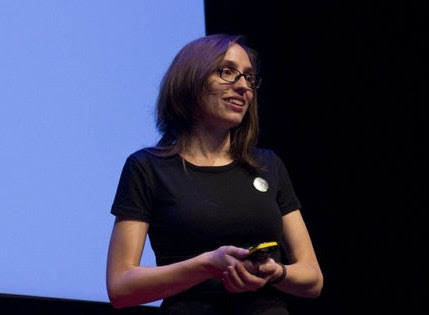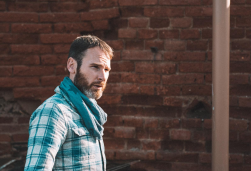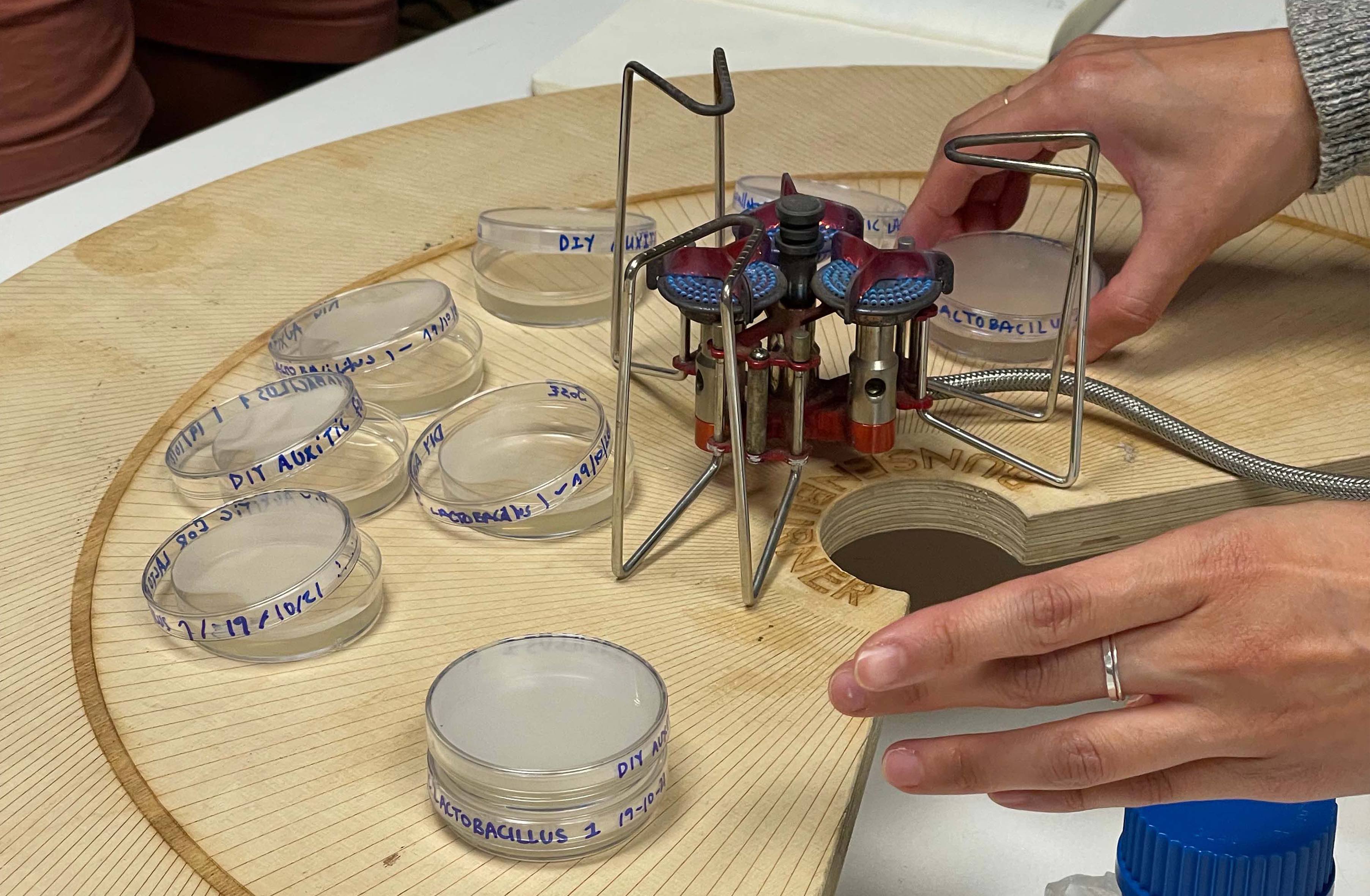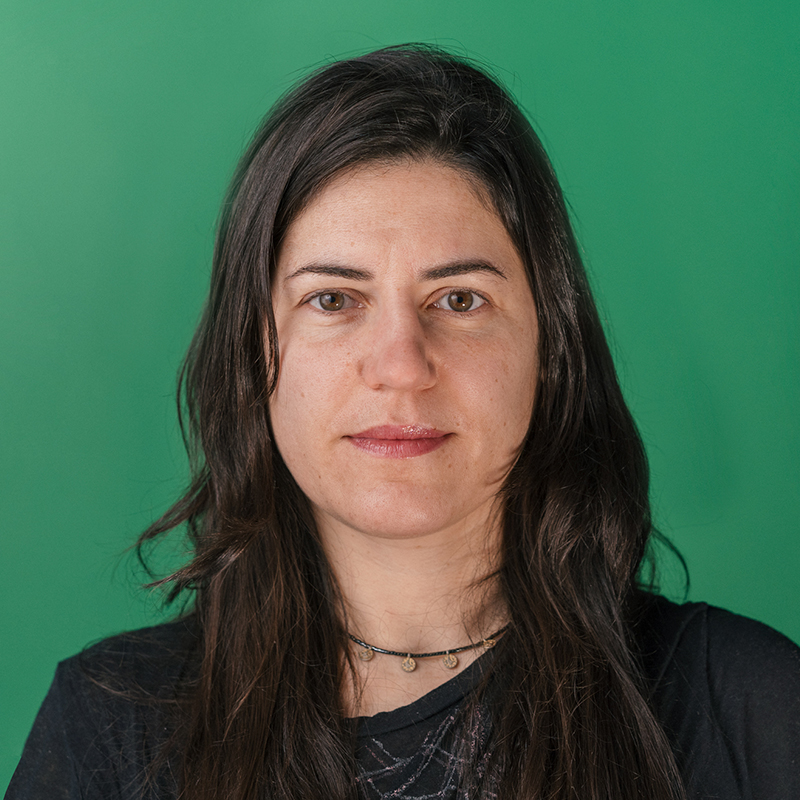Syllabus⇝
The recent growth of the international DIY-Bio / I-GEM and Bio Hackers networks are born of a motivation to narrow the golf between research conducted in institutional and corporate settings and to redirect the scientific locus back towards citizen scientists. The agenda of democratizing access to the sciences is shared with that of libre software and open-source electronics and maker movements.
Access to the means experimentation for the investigative and applied sciences will not only change the way we understand and describe the world but also bring forth new knowledge, designs, and engineering practices previously constrained to larger-scale operations. Through the course, researchers will learn how to identify microorganisms, how to take samples and prepare cultivation media, how to observe microscopic organisms and to obtain amplify DNA and analyze it. Researchers will be introduced t scientific concepts such as sterility, metabolism, genome, synthetic biology, biochemistry, and microbiology. Gaining the ability to make creative decisions and construct logical frameworks for study and production in the field of biology.
'Consumer culture' portrays itself as the provider of instant access to any commodities we could want, from anywhere in the world, at an affordable price.
This discourse, detached from the material process of production of these commodities (e.g. textiles/minerals/meat/pornography/plastics) invisibilizes the difficult truths intrinsic to their production. The sites of production are conveniently 'elsewhere' than the global north which reaps the rewards of this eco-social devastation.
While a superficial 'awareness' of the social and ecological impact is readily provided by this same culture there is an absence of concrete and viable actions informed by material reality that do not lend themselves to become similarly commodified themselves.
Through practice comes knowledge, by working directly with materials to understand the skills, energy, resources, chemistry, economics and human labor underpinning their production we can begin to envision alternative approaches to organizing production.
'Material Craftivism' is a practice-based approach to material research and knowledge exchange with the aim of developing and supporting alternative frameworks of production and consumption.
We want to create a society of material makers, where open recipes are shared and democratised, enabling practitioners to design the performance, the aesthetical qualities, the properties and the life cycle of products, services and platforms.
Deliverables⇝
-
Students will design and hand-in their own notebooks in an innovative research fashion.
-
A designed experiment following scientific methods will also be delivered.
The participants will need to handout:
1- A booklet (pdf) documenting:
a. Their home apparatuses set up (tools and appliances)
b. The different recipes they create
c. A concept idea of a product, service, or platform on biobased solutions.
2- Create a collaborative material catalogue of physical samples together with their classmates.
Additional Resources⇝
(https://www.youtube.com/watch?v=_kc0IFavUes)
(http://biohackacademy.github.io/)
(https://drive.google.com/file/d/1gz7h1kExAhIV86wyzHpb3gF9YU5SvABP/view)
(https://drive.google.com/file/d/18JlJtiFxO17JpmPP_LGrtM2DB8NDsebS/view)
(https://drive.google.com/file/d/1srtlXcN2LyFnps7lP28i-NMMmx0A_srw/view)
Faculty⇝

Nuria is a post-doctoral researcher at Complex Systems Laboratory at Universitat Pompeu Fabra (UPF) in the PRBB. She holds a major in Biology and a engineering in informatics and performed her research thesis about Biocomputation, that it is at the interface of both fields. Nuria teaches biology for architects, artist and designers of IAAC, Elisava or Massana universities and is a founder member of the DIYBioBcn, the first biohacking group of Spain.

Jonathan Minchin studied Fine Arts and Design Craftsmanship and digital Fabrication. He attained BA in Architecture and a masters degree MSC in ‘International Cooperation, Sustainable Emergency Architecture’ in 2010. He is coordinator of the EU funded research project called ROMI (Robotics for Microfarms) and has spoken at the European Commission and British Parliament.
In this field he has worked on housing and development projects alongside ‘Habitat for Humanity’ in Costa Rica, ‘UNESCO’ in Cuba and with ‘Basic Initiative’ in Tunisia.
He has worked in conjunction with ‘UN-Habitat’ in Barcelona and holds a particular interest in appropriate technology, bioregional industries and agroecology. His professional career has focused on architectural and urban development projects with Architects Offices in both England and Spain and his writing on “Geographic referencing for Technology Transfer” was published in the book “Reflections on Development and Cooperation” in 2011. He took part in the Fab Academy, Bio Academy and Coordinated the Green Fab Lab and Valldaura campus between 2012 and 2017.
Jonathan has also worked on the on the DIYBio Barcelona project.
Anastasia is a Greek architect that has been working with Digital Fabrication technologies, design and education since 2009. She has been part of Fab Lab Barcelona (IAAC) since 2011 as a researcher, practitioner, advanced manufacturing officer and project leader in the Textiles and Materials research area. In 2013 she co-founded fabtextiles.org, a research laboratory on textiles, soft architectures, innovative materials, and sustainability. In 2017 she co-founded Fabricademy, Textile and Technology Academy, a distributed educational program and community of practitioners that promotes and researches the implications and applications of wearable technology and Digital Fabrication in Fashion, Textiles and Biology. Anastasia has participated in several European-funded projects managing topics such as artistic residencies, society and culture, circular economy and sustainability in the European Textile & Clothing sector, co-creation methodologies, science with and for society, gender inclusion, female creativity and innovation potential, among others: EASTN, Made@EU, TCBL, SISCODE and Shemakes. She promotes open knowledge and sharing practices with various available publications in biomaterial making, additive manufacturing, digital fabrication and sustainability. Moreover, Anastasia has been a curator and producer of the annual exhibition on FabTextiles Digital Fashion and Wearables Showcase since 2014. Combining digital fabrication techniques and crafts, she demonstrates how new technologies can shift the massive consumption and fast production to a customized, open-source, personal and local fabrication applied to education, everyday life and new enterprises.

